Key takeaways
- Constituent engagement is vital for effective governance, fostering trust and transparency while reflecting community needs.
- Effective communication, including active listening and relatable storytelling, enhances understanding and encourages participation in policy discussions.
- Building lasting relationships through genuine engagement and transparency creates a collaborative environment for meaningful change.
- Follow-ups after discussions reinforce trust and demonstrate that constituents’ voices are valued beyond initial conversations.

Understanding Louisiana government politics
Understanding Louisiana government politics requires recognizing its unique blend of history, culture, and governance. Growing up in Louisiana, I often felt the pulse of community discussions at local coffee shops, where residents passionately debated policies. It made me realize how deeply personal these matters are to many people—they’re not just abstract concepts, but issues that affect daily lives.
The political landscape here is marked by a distinct mix of traditional Southern values and vibrant cultural influences, which complicates the decision-making process. I vividly remember attending a town hall meeting where constituents voiced their concerns about education funding. It struck me how deeply people cared about the future of their children—these conversations are not just about policy, but about hearts, dreams, and the very fabric of our society.
Moreover, Louisiana’s political system can feel complex, with various layers of local, state, and federal influence. It’s fascinating how different regions within our state can present such contrasting views on the same issue. I often wonder, how can we bridge these gaps? Engaging directly with constituents has shown me that many are eager to share their perspectives, highlighting the importance of listening and learning in shaping effective policies.
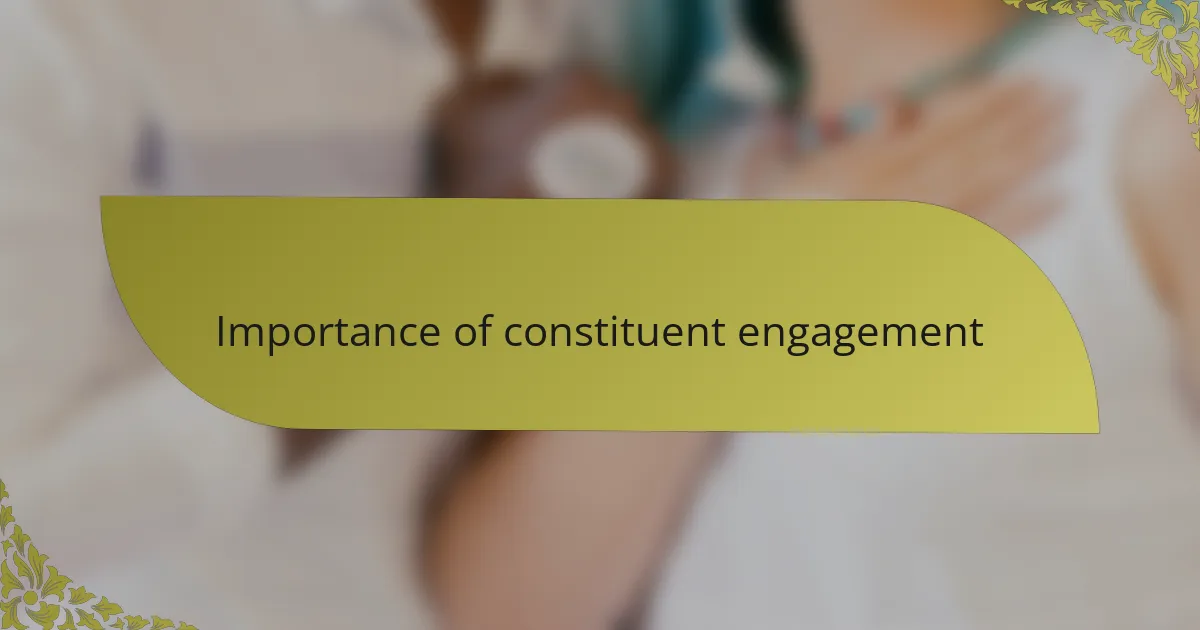
Importance of constituent engagement
Engaging with constituents is not just a formality; it’s essential for effective governance. From my experience, when I took the time to engage directly with my community, I witnessed firsthand how important it is for citizens to feel heard. During a town hall meeting, a resident expressed her concerns about local education funding. Her emotions were palpable—after our discussion, she felt reassured, knowing that her voice could influence policy.
Constituent engagement fosters trust and transparency, allowing policymakers to craft legislation that truly reflects the needs of the community. It’s a two-way street: as I listen to feedback, I often find that these conversations spark new ideas, leading to innovative solutions for pressing issues.
- Encourages a sense of community ownership in governance.
- Provides valuable insights into the priorities and concerns of constituents.
- Builds trust between elected officials and the public.
- Enhances transparency in decision-making processes.
- Facilitates informed policy-making based on real-life experiences.
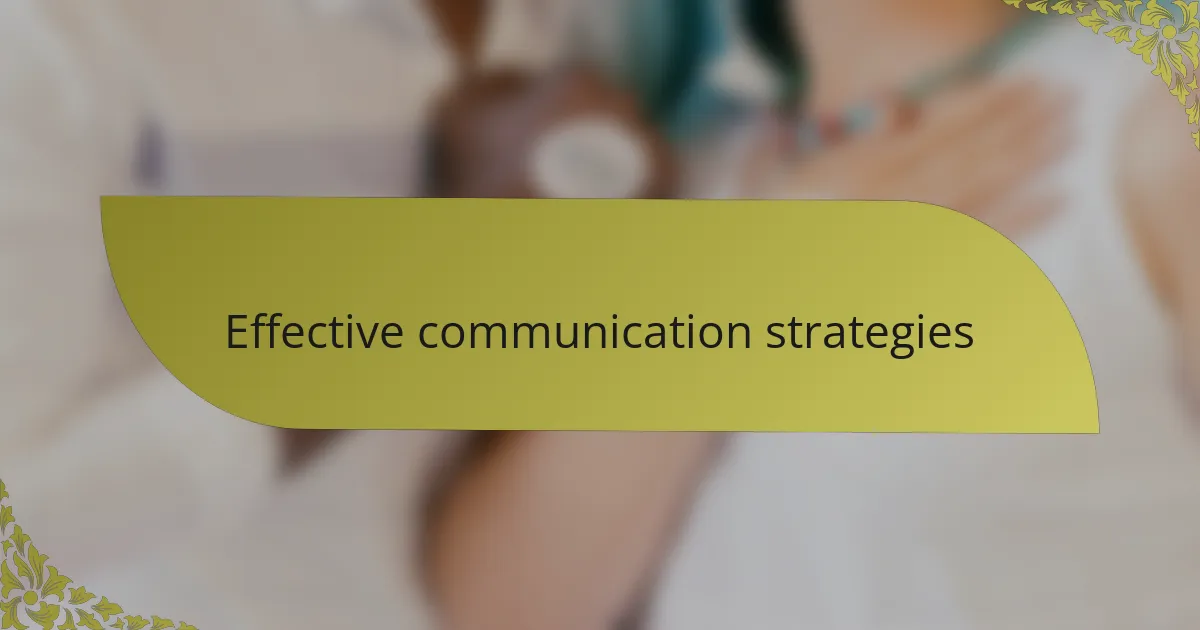
Effective communication strategies
Effective communication is at the heart of meaningful discussions about policies with constituents. I always strive to create an inviting atmosphere where constituents feel heard and valued. One method I’ve found particularly effective is to hold community forums, where people can voice their opinions in a casual setting. This approach not only fosters trust but also opens the door for honest conversations.
Additionally, I prioritize active listening. It’s essential to show empathy and understanding when discussing how policies impact people’s lives. Once, during a town hall meeting, a constituent shared a personal story about how a proposed policy change might affect her family’s future. Her vulnerability struck a chord with everyone, including myself, reinforcing the importance of emotionally connecting with constituents beyond just the facts.
- Be approachable: Create a welcoming environment for open discussions.
- Use community forums: Facilitate informal gatherings where constituents can express their views.
- Listen actively: Show genuine interest in constituents’ stories and concerns.
- Tailor your message: Address specific community needs and experiences when discussing policies.
- Follow up: Keep the lines of communication open by providing updates and seeking feedback.
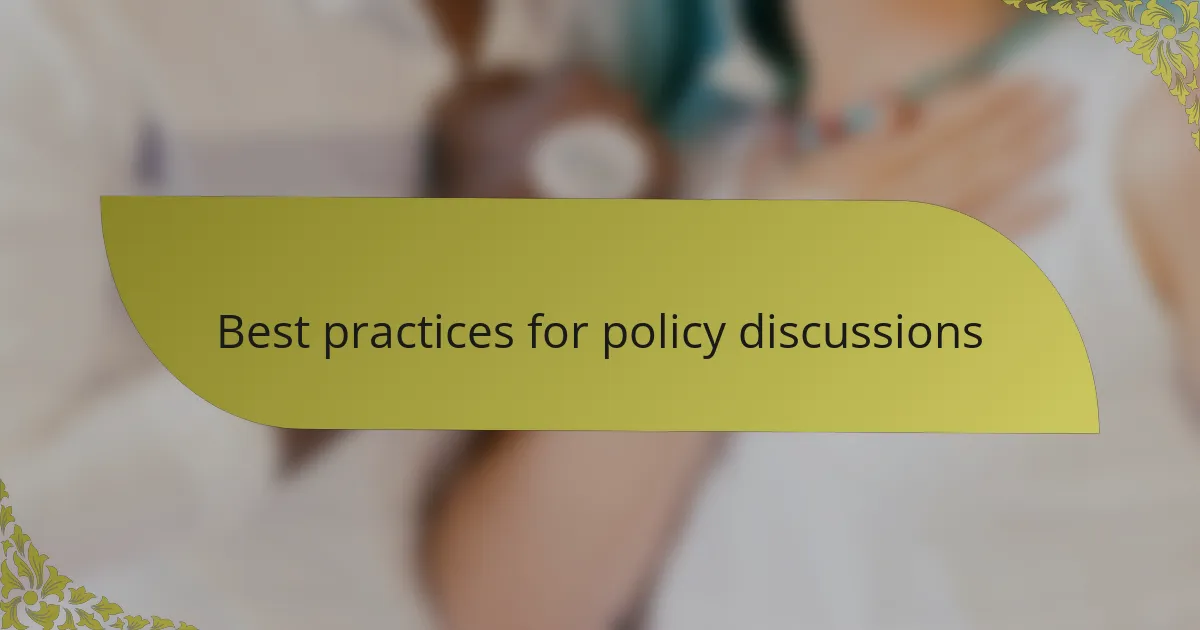
Best practices for policy discussions
When discussing policies, I’ve learned that clarity is crucial. I recall a moment during a community meeting when I used straightforward language to explain a complex education reform. The change in the room was palpable; people began to nod and engage with questions. It reinforced my belief that breaking down intricate ideas into simple terms can demystify the political process and encourage participation.
Moreover, I find that sharing relatable stories about how proposed policies impact real lives deeply resonates with constituents. For instance, I once shared a story about a local family facing challenges due to budget cuts. This not only personalized the issue but also sparked a passionate conversation about potential solutions. Engaging on such an emotional level seems vital in fostering a sense of ownership and urgency among community members.
Finally, I’ve discovered that follow-ups are just as important as the initial discussions. After policy talks, I make it a point to reach out to constituents to provide updates and invite further feedback. This ongoing dialogue helps build trust and shows that their opinions are valued well beyond the meeting. How often do we feel forgotten after a conversation? Consistent communication can bridge that gap and keep the community engaged.
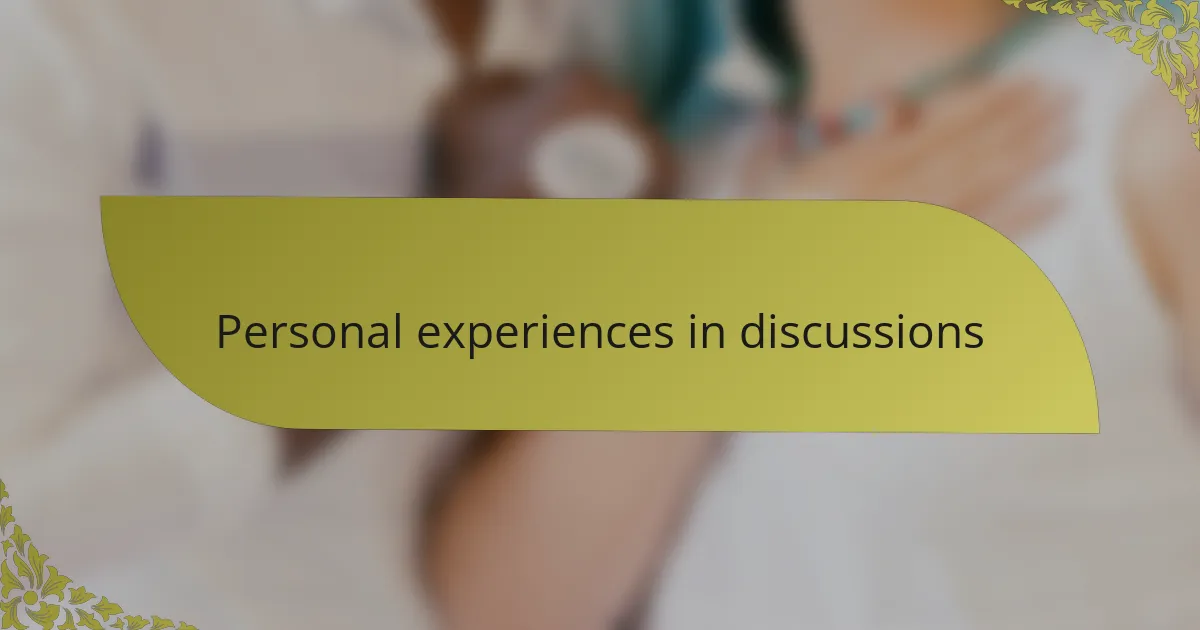
Personal experiences in discussions
When I first dove into discussions about policies with constituents, I quickly realized the importance of listening. One interaction that stands out to me was with a local farmer who expressed his concerns about environmental regulations. As he spoke passionately about his family’s legacy and the challenges he faced, I felt a deep connection to his struggles. It underscored how vital it is to understand the human side of policy.
On another occasion, I spoke with a group of seniors at a community center who were worried about health care access. Their stories were filled with apprehension and frustration, which reminded me how real these issues are for many. It shook my preconceptions and made me appreciate the gravity of decisions we make.
- Listening actively builds trust and rapport.
- Personal stories can shift perspectives on complex issues.
- Engaging in dialogue promotes understanding of real-world impacts.
- Emotionally charged discussions often lead to more informed policy-making.
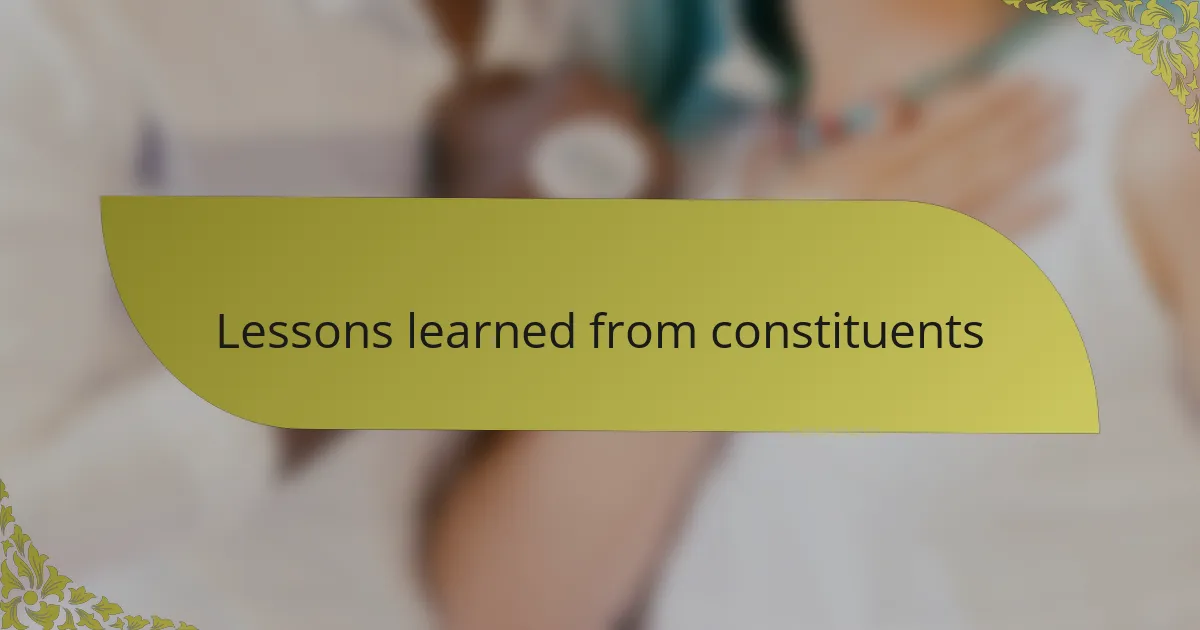
Lessons learned from constituents
Engaging with constituents taught me that listening is just as important as speaking. I remember a town hall meeting where a senior citizen expressed her concerns about healthcare access. Her voice quivered with emotion, revealing the real impact of policies on everyday lives. This experience made me realize that behind every policy discussion, there are heartfelt stories that deserve attention.
One crucial lesson is that constituents often see the effects of policies firsthand that we may overlook. They provide invaluable insights into the practicality of legislation. It’s not just about numbers; it’s about real-life implications. Here are some key takeaways from my discussions:
- Understand Diverse Perspectives: Every constituent has a unique viewpoint shaped by their experiences.
- Encourage Open Dialogue: Allowing space for conversation often brings out essential issues that need addressing.
- Be Approachable: Foster an environment where constituents feel comfortable sharing their challenges and suggestions.
- Acknowledge and Empathize: Recognizing constituents’ emotions builds trust and fosters collaboration in the policy-making process.

Building lasting relationships in politics
Building lasting relationships in politics hinges on genuine engagement. I’ve found that when constituents see you as a real person—someone who cares about their issues—they’re more likely to open up. I remember one night at a community gathering; a young mother approached me to discuss the lack of after-school programs. Her concern wasn’t just about her child; it represented so many families struggling to balance work and parenting. It made me realize that these conversations could forge lasting bonds that benefit both constituents and policymakers.
Trust is another crucial element in these relationships. I think back to an experience where I was open about the challenges we faced in the legislative process during a town hall meeting. People appreciated the honesty, which led to deeper conversations about their expectations and needs. It’s fascinating how transparency can break down barriers and cultivate a sense of shared purpose. When constituents feel like stakeholders in the political process, it fosters a collaborative environment where meaningful change can happen.
Furthermore, I’ve learned that persistence in maintaining these relationships is vital. I try to follow up with constituents after our discussions, checking in and providing updates on policy developments. This ongoing dialogue not only shows that I value their input but also strengthens our connection. Have you ever noticed how a simple follow-up can turn a brief conversation into a long-term relationship? It’s these small gestures that make a big difference in the political arena, reinforcing that we are in this together.